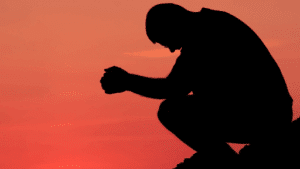
Our focus in the forgiveness of others is obviously the other person: the cultivation of mercy and grace for the one who has hurt us. But sometimes our forgiveness can feel incomplete. That resentment can still feel so close beneath the surface, as if it’s still lurking in there. As if one wrong word could set off an explosion that sets fire to all the work we’ve done so far. Why?
It seems counter-intuitive, but an important component of forgiveness can actually be forgiveness of self. We know this because of the second greatest commandment, “Love your neighbor as yourself”. (Matthew 22:39, Mark 12:31.) Forgiveness of another is inextricably linked to the forgiveness of self, because self condemnation can be exactly the obstacle to extending grace to another.
Archbishop Desmond Tutu, a very influential leader during South Africa’s struggle with apartheid, wrote a book with his daughter, Reverend Mpho Tutu, about forgiveness called The Book of Forgiving: The Fourfold Path for Healing Ourselves and Our World. Their book explained that even in their particular situation of utter injustice and extreme racial violence, the one who perpetrates the injustice as well as the victim must both look squarely inside and address their own remorse, mistakes, and self hatred before attempting to build a bridge.
It begins with enlarging our view of ourselves as human beings. We are larger than what we’ve done wrong or, in turn, what was done to us. We are deep and multi-layered and complicated. Yes, we have made horrible mistakes and had so much perpetrated on us in return, but we are also capable of so much good. We have a responsibility to restore ourselves after our mistakes, and recognize the goodness to which we were born.
The Tutus wrote: “We are not responsible for what breaks us, but we can be responsible for what puts us back together again.”
God puts us back together because He knows us at our best, and He loves us in our dust. This is the completeness of His forgiveness.
For as high as the heavens are above the earth,
so great is his faithful love toward those who fear him.As far as the east is from the west,
so far has he removed our transgressions from us.As a father has compassion on his children,
so the LORD has compassion on those who fear him.For he knows what we are made of,
remembering that we are dust. Psalm 103:11-14 NIV
The Tutus described four steps to forgive ourselves.
First is to tell the story. Tell it completely in all its ugliness. We are storytelling beings, and it is how we put the event into a context we can look at clearly.
Second is to name the hurt. That can be hard to do. It’s hard to relive our offense, but to go back and put a name on what we did wrong is to take away its mystery and power. But naming it acknowledges the harm we need to take responsibility for, and puts the mistake in a box.
Third is to grant ourselves forgiveness. This doesn’t mean we erase our accountability. But it reminds us that the extension of grace to ourselves is about the transformation of our sin so that we are better humans than we were before the mistake.
Fourth is the renewal. The embracing of our inherent goodness again. Renewal is the opening of the box and letting it go.
by Carie Grant

